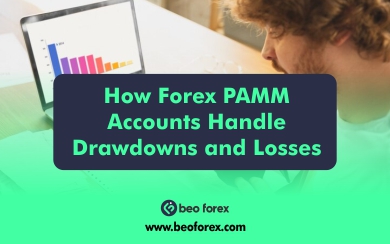How Forex PAMM Accounts Handle Drawdowns and Losses is a crucial aspect of understanding how these managed investment accounts operate in volatile market conditions. Drawdowns happen with every forex trading, but how they are managed can create the difference between long-term success and serious financial setbacks. With the PAMM, or Percent Allocation Management Module accounts, one immediate plus an investor can have is the management of his or her funds by a competent trader. But then again, investment under these conditions has its inherent risks in market losses. It therefore requires a mix of strategies to manage the risk, transparency, and communication between the PAMM manager and the investors for him/her to effectively handle any drawdowns efficiently and minimize losses. The following article looks at the mechanism of forex PAMM accounts handles drawdowns and losses
Drawdowns in Forex PAMM Accounts
Forex PAMM Accounts Drawdowns and Losses: Within a Forex PAMM account, a drawdown is the reduction of equity due to a series of losing trades. Normally, it reflects a degree of decline from the highest value to the lowest point and shows the percentage an account has fallen in value in some period of time. The drawdown is a natural condition that happens with literally any trading process, not to mention forex, where price changes may get pretty swift and unpredictable.
Difference between Temporary Drawdown and Long-Term Losses
- Temporary Drawdown: Temporary drawdown occurs when the account experiences a dip in value but eventually recovers over time as the PAMM manager adjusts his strategy or market conditions improve. These are usually just considered part of ordinary trading and, really, nothing to worry about, particularly if the manager has a good track record of recovering from market downturns.
- Long-term Losses: Long-term losses on the other hand, are associated with cases when the account does not recover from the drawdown and continues to go down in value. This may be a result of poor decisions about trading, unfavorable market conditions, or weak risk management. Long-term losses might indicate inefficiency in PAMM manager strategies and can thus serve as some kind of signal for investors to reconsider participation in an account.
How PAMM Managers Handle Drawdowns
Below is an peak on how forex PAMM accounts handles Drawdowns and Losses
1. Risk Management
PAMM managers use tight risk management, such as position sizing and stop-loss orders, in order to limit losses. This ensures that no one trade causes too much damage to the account.
2. Diversification
The managers further diversify across currency pairs and trading strategies. This reduces the impact of market downturns in any single area and helps in balancing the overall performance.
3. Adjustment of Trading Parameters
When the markets are volatile, managers reduce leverage or trim down positions to dampen the risk of such minor drawdowns spiraling out of control.
4. Monitoring and Adjusting
By continuous monitoring of the markets, the managers change strategies during runtime, keeping the big picture in mind while making decisions based on data to take appropriate action against drawdowns.
5. Capital Preservation
In cases of drawdowns, capital preservation becomes the keyword, where a scaling back of trading is carried out until market conditions improve, and further losses are avoided.
Communication of Drawdowns to Investors
1. Transparency
PAMM managers give a regular update about the performance of the account, including the drawdowns of the account, so that investors can be continuously informed of the current status and their challenges.
2. Real-Time Reporting
This is made possible through real-time reporting provided for in many PAMM platforms. Investors will therefore have first-hand access to the information concerning every drawdown as it occurs. Immediately accessing this information will create trusts and cut anxiety among investors whenever the market shows contingencies.
3. Monthly Statements
Most of the PAMM managers provide comprehensive month-to-month statements, as these synopsize and synthesize the account performance for the stated period, its drawdowns, and how to rectify them.
4. Transparency in Communication
During drawdown periods, managers usually address their investors directly; they explain the situation, what happened, and the steps they are taking to recover. All this proactive communication develops greater transparency and builds trust between the manager and the investor.
Dealing with Losses in PAMM Accounts
1. Strategic Recovery
The moment losses arise, what PAMM managers try to do is a strategic recovery rather than enter impulsive trades. It reassesses the market conditions and modifies their trading strategies according to the same, hence resorting to more conservative methods that would help them regain the lost money.
2. Risk Control
To avoid further losses, managers reduce the size of the trades or even refrain from trading when the volatility becomes too high. In this way, the remaining capital is protected from further deterioration, and the compounding losses are avoided.
3. Preservation of Capital
The preservation of capital is of great importance during periods of losses. Rather than trying for quick recovery and hoping to achieve it, PAMM managers will focus on preserving the remaining balance of the account and look at long-term growth instead of immediate gains.
4. Re-evaluation of Strategies
If the losses continue, then the PAMM manager revises his trading strategy, finding out the source of his loss and readapting the means to fit the current market trends.
Investor Responsibilities in PAMM Accounts
1. Risk Tolerance Setup
The investors have to clearly indicate the level of risk tolerance when choosing a PAMM manager. That is, they must state the extent of their preparedness for losses, stating what drawdown limits they can be comfortable with.
2. Monitoring on a Regular Basis
It is absolutely crucial for investors to become engaged with the performance of their PAMM account on a regular basis. This means not only studying account statements and updates but also, in fact, communicating with the PAMM manager regarding all drawdowns and losses incurred.
3. Being in Contact with a Manager
Investors are expected to be in close contact with the managers of their PAMM accounts. In case they feel apprehension or have questions regarding certain performances or strategies, they should never hesitate to approach them for an explanation.
4. Patience in Drawdowns
Investors should not be impatient if some drawdown occurs. They will not impulsively take unwise decisions, such as trying to withdraw all or part of their money in case of a downturn if they can realize that ups and downs are a part of trading.
5. Due Diligence
Investors should do research on the manager they are interested in before depositing funds with a PAMM. They research performance history, trading strategies, risk management practices that are appropriate for an investor’s goals.
How PAMM Accounts Mitigate Major Losses
1. Professional Managers
The accounts in PAMM are managed by professional managers who have deep knowledge about the market behaviors. Their experience helps a lot in applying the best techniques to get rid of the adverse situations in the market and avoid huge losses.
2. Strong Risk Management
PAMM managers have good risk management techniques, such as placing strict stop-loss orders and maintaining proper position sizing. These are some of the measures that help minimize potential losses from each trade by protecting the account equity.
3. Diversification of Investments
Diversifying investments across different currency pairs and trading strategies limits exposure to a single market event. The idea behind this investment diversification is to cushion the impact of adverse movements in the market, hence reducing the risk of a significant loss.
4. Regular Performance Reviews
PAMM managers go through periodic performance appraisals to review their trading strategies and make amends where needed. This proactive approach keeps them way ahead in establishing problem areas that may arise and employing corrective measures before the losses balloon.
5. Transparent Communication
It is necessary to be open with investors and keep transparent communication. For the PAMM managers in this case, what it does is update investors on market conditions and the steps being taken in order to minimize the risks. In such a way, investors would feel their trust and confidence warranted even during hard times.
Pros Drawdown Management in PAMM Accounts
- Better Capital Preservation: With effective strategies of drawdown management, investor capital is protected when markets decline to retain the funds for possible future trading opportunities.
- Good Risk Management: With risk management measures in place, such as stop-loss orders and diversification, PAMM managers can contain losses well within a potential threshold so that the general account does not suffer from hard drawdowns.
- Investor Confidence Boosts: Transparency in drawdown management enhances investor confidence in a manager who can show them his plan for handling the drawdown. Investors will be less anxious and can have better trust in such a manager.
- Long-Term Growth Potential: With drawdown management, PAMM managers can get the account in a better place to realize long-term growth. Minor drawdowns, recovered well, may eventually translate into long-term profitability over time.
Cons Drawdown Management in PAMM Accounts
- Limited Short-Term Gains: This might lead to more conservative trading strategies, which also equate to smaller gains in the short-term. For investors who want to make a profit and get out quick, this is not as appealing.
- Overly Conservative Trading: On the opposite side of this coin, trying to control drawdowns can also create a situation where a PAMM manager is much too conservative and thereby relinquishes good profit opportunities when market conditions are favorable.
- Communication Complexities: Drawdown management strategies are often quite tricky to explain to investors, let alone their rationale. In case the reason behind managing drawdowns is not sinking into the minds of investors, misconceptions may be created.
- Psychological Impact on Investors: Whereas drawdown management is devised as a capital protection technique, the era of loss associated with it tends to keep investors apprehensive. Under such psychological stress, they can get into unwarranted decisions like undue redemptions.
Frequently Asked Questions (FAQs)
How do PAMM managers control the losses?
- PAMM managers can cut losses with various risk management techniques: stop-loss orders, distribution of investments between different currency pairs, and using position sizing to manage overall exposure.
Can investors withdraw money during a drawdown?
- Yes, in most cases, this is possible during a drawdown, but always one should keep in mind what consequences it may have on account recovery afterward. A withdrawal during a downtrend may lead to the crystallization of losses and poor future growth.
How often does a drawdown happen with PAMM managers?
- Drawdowns are the most common thing in trading, and it happens up to several times in a year, as the market conditions and the trading strategies of the PAMM manager permit.
Is it possible for a PAMM account to recover after a major drawdown?
- Of course, a PAMM account may recover after a big drawdown if the PAMM manager does everything right in order to recover and has a good trading plan. Recovery could take time according to market conditions.
























